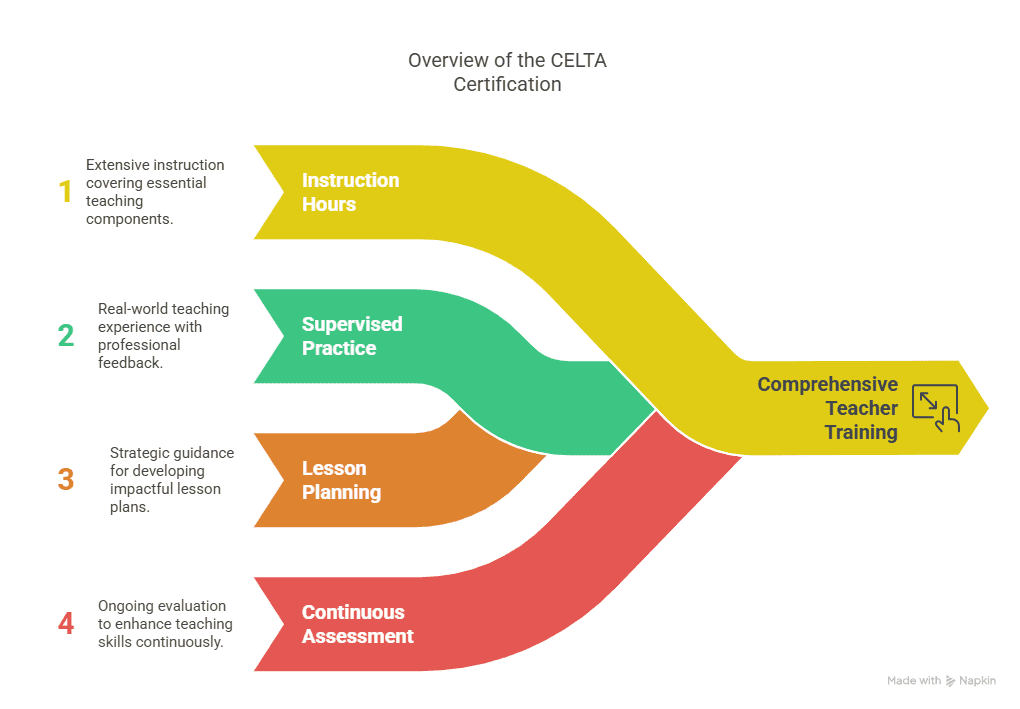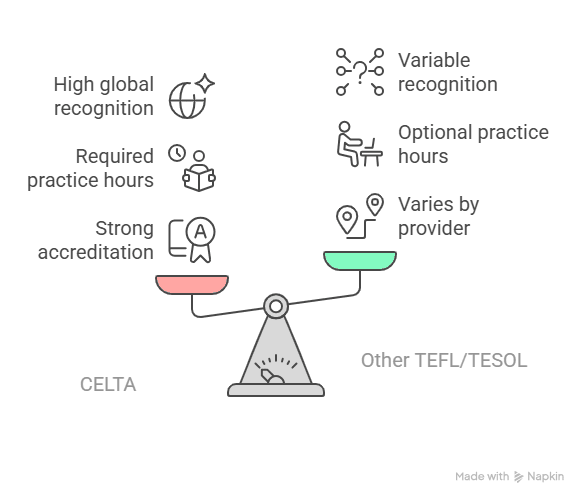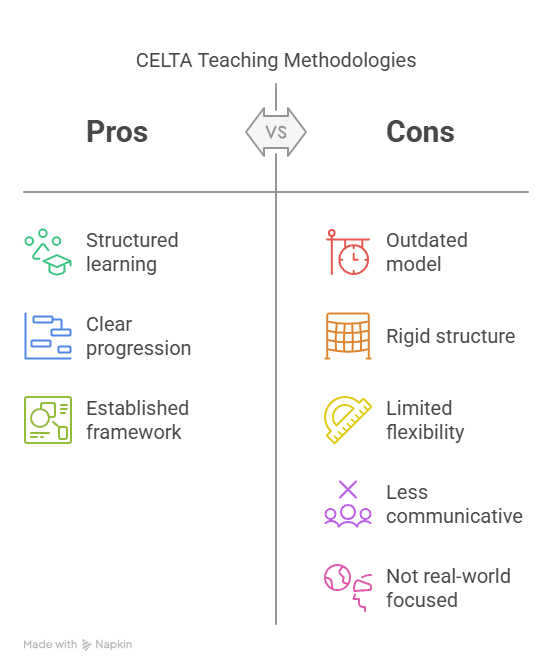Accredited by Cambridge Assessment English, CELTA is often regarded as the “gold standard” for aspiring English teachers. With a structured curriculum that combines theoretical knowledge with hands-on teaching practice, CELTA is designed to equip candidates with essential skills for the classroom. However, many prospective teachers ask, Is CELTA worth its effort and money? This blog post explores the key aspects of CELTA, including its benefits, challenges, and overall value. By examining its global recognition, career advantages, cost considerations, and criticisms, we will provide a balanced perspective to help you decide if CELTA is the right choice for your teaching career: if it worths its effort and financial commitment.
What is CELTA?
Overview of the Certification
CELTA (Certificate in English Language Teaching to Adults) is an internationally recognized qualification awarded by Cambridge Assessment English. It is designed for individuals who want to teach English to non-native speakers, whether in private language schools, corporate training programs, or online platforms.

The course follows a structured curriculum that includes:
- 120 hours of instruction, covering language analysis, teaching methodologies, and classroom management.
- Supervised teaching practice, where trainees teach real students and receive feedback from experienced trainers.
- Lesson planning guidance, helping candidates develop effective teaching strategies.
- Assessment through continuous evaluation, rather than final exams.
CELTA is available in full-time (typically four to five weeks) and part-time (spread over several months) formats, allowing flexibility based on individual schedules. It can be taken in-person at authorized centers worldwide or online, maintaining the same level of rigor.
Who is CELTA for?
CELTA is suitable for a wide range of individuals, including:
- Aspiring English teachers who want to enter the field with a strong foundation.
- Career changers looking for opportunities in English language teaching.
- Non-native English speakers (with a C1 or higher level of English) who want an internationally recognized teaching qualification.
- Current teachers seeking professional development and career advancement.
Comparison of CELTA with Other Teaching Certifications
There are several English teaching certifications available, and it is important to understand how CELTA compares withother TEFL and TESOL qualifications in the market.

| Certification | Accreditation | Practical Teaching Component | Reputation & Recognition | Time Commitment |
|---|---|---|---|---|
| CELTA | Cambridge Assessment English | Required (6+ hours with real students) | Highly recognized worldwide | 4-5 weeks (full-time) / several months (part-time) |
| Other TEFL (Teaching English as a Foreign Language) Certifications | Varies (no single accrediting body) | Sometimes included, but often optional | Recognition varies by provider | Ranges from 20 to 120+ hours |
| Other TESOL (Teaching English to Speakers of Other Languages) Certifications | Varies by provider | Sometimes included | Recognition depends on provider | Typically 120+ hours |
While Other TEFL and TESOL courses can be more affordable and flexible, they do not always include supervised teaching practice, which is a key feature of CELTA. Employers often prefer CELTA-certified teachers due to the rigorous training and assessment process.
CELTA’s structured and practical approach makes it a strong choice for those who want to teach English professionally, especially in competitive job markets. However, for those seeking a more budget-friendly or less intensive option, other TEFL or TESOL might be suitable alternatives.
Trinity CertTESOL, and OnTESOL are two of the most popular and respected TEFL certifications in the market. Each has its unique features, strengths, and limitations. Heres’ a detailed comparison to help you decide which one aligns best with your goals, budget, and preferences.
Benefits of CELTA Certification
CELTA International Recognition

One of the most significant advantages of CELTA is its global acceptance as the “gold standard” in English language teaching. The certification is awarded by Cambridge Assessment English, a globally respected institution, ensuring its credibility and consistency across different countries and teaching contexts.
- CELTA is recognized and valued by employers worldwide, making it easier to secure teaching jobs abroad or online.
- Many prestigious language schools and institutions prioritize CELTA-certified teachers due to the rigorous training they receive.
- Unlike some TEFL or TESOL courses, which vary in quality depending on the provider, CELTA maintains a standardized curriculum and assessment process, reinforcing its reputation as a high-quality qualification.
Rigorous Training and Skill Development
CELTA’s structured curriculum ensures that candidates gain practical and theoretical knowledge essential for effective teaching. The program includes:
- 120 hours of coursework, covering teaching methodologies, language awareness, and lesson planning.
- Supervised teaching practice, where candidates teach real students and receive personalized feedback.
- Guided lesson planning, helping candidates develop clear, structured, and engaging lesson plans.
- Focus on classroom management, equipping teachers with strategies to handle different student dynamics and learning challenges.
The intensity of the course ensures that graduates develop the necessary skills to manage real classrooms confidently, even if they have no prior teaching experience.
Enhanced Career Opportunities

CELTA certification provides a competitive edgein the job market, opening doors to reputable schools and language institutions across the globe.
- Many top-tier language schools require CELTA as a minimum qualification.
- CELTA-certified teachers often receive higher salaries compared to those with only generic TEFL/TESOL certificates.
- Having CELTA can lead to career progression opportunities, including roles such as senior teacher, director of studies, or teacher trainer.
Flexibility for Non-Native Speakers
CELTA is not limited to native English speakers; non-native English teachers with a CEFR C1 level or higher are eligible to enroll. This inclusivity allows proficient non-native speakers to gain access to international teaching opportunities.
- The course assesses teaching ability rather than just language proficiency, allowing skilled non-native speakers to compete in the global job market.
- CELTA provides structured training in pronunciation, grammar, and communication strategies, helping non-native teachers refine their skills.
Practical Teaching Experience
One of the defining features of CELTA is its hands-on teaching practice, setting it apart from many TEFL and TESOL courses.
- Candidates teach real students in observed lessons, receiving constructive feedback from experienced trainers.
- The continuous assessment process ensures that trainees improve their teaching techniques throughout the course, rather than relying on a final exam.
- Teaching practice helps candidates build confidence and adaptability, preparing them for real-world classroom scenarios.
This practical approach ensures that CELTA graduates are not just theoretically trained but also classroom-ready, a quality highly valued by employers.
Challenges of CELTA Certification
Cost Considerations

One of the most significant concerns for prospective CELTA candidates is the financial investment required. The course can be expensive, with tuition fees ranging from $1,500 to $3,000 USD, depending on the location and mode of study (online or in-person).
- Additional costs may include travel, accommodation, visa fees (for international candidates), and study materials.
- If taking the course in another country, candidates must also factor in living expenses for the duration of the program.
- Unlike some TEFL courses that offer budget-friendly alternatives, CELTA’s fixed pricing and accreditation standards leave little room for cost variation.
While CELTA can lead to better job opportunities and higher salaries, the upfront investment may be a barrier for some candidates.
Intensive Time Commitment
CELTA is known for being highly demanding, requiring significant time and effort to complete. Candidates can choose between:
- Full-time (4–5 weeks): Extremely intense, often requiring 8+ hours per day of study, lesson planning, and teaching practice. Many trainees describe this as a life-consuming experience, leaving little time for personal or professional commitments.
- Part-time (several months): More manageable for those with existing jobs or responsibilities but still requires consistent dedication and high workload.
Common challenges include:
- High levels of stress and burnout due to tight deadlines for assignments and lesson plans.
- Balancing teaching practice with coursework, making it difficult to keep up with all aspects of the course.
- Little room for error, as trainees must quickly adapt to feedback and improve within a short period.
CELTA is not for the faint-hearted; candidates must be prepared for an intensive, high-pressure learning environment.
Potential for Failure
Unlike many other TEFL certifications, CELTA has strict assessment criteria, and there is a real risk of failing if candidates do not meet the required standards.
- Teaching practice is constantly evaluated, and trainees must demonstrate improvement to pass.
- Written assignments must meet Cambridge’s academic standards, with some candidates struggling with the reflective and theoretical components.
- Common reasons for failure include:
- Struggling with lesson planning under time pressure.
- Difficulties adapting to feedback and making improvements.
- Challenges managing a classroom, especially for those with no prior teaching experience.
Failing CELTA can be demoralizing and financially costly, as retaking the course requires additional fees.
Limited Refund Policies
CELTA courses typically have strict non-refundable policies, meaning candidates who withdraw for personal or professional reasons may not get their money back.
- If a candidate faces illness, personal emergencies, or an unexpected workload, they may have to drop out without reimbursement.
- Some centers offer deferral options, but these are not always guaranteed.
- Financial risk is particularly high for self-funded candidates who cannot afford to re-enroll.
Trainees must be fully committed before enrolling to avoid losing their investment.
Criticism of Teaching Methodologies Used in CELTA

Despite CELTA’s reputation, some educators criticize its methodological approach as being too traditional and coursebook-dependent.
- The course primarily follows a Presentation, Practice, and Production (PPP) model, which some experts argue is outdated compared to newer, more dynamic approaches.
- Alternative teaching methods, such as:
- Task-Based Learning (TBL) – A more communicative, real-world approach that focuses on language use rather than rigid lesson structures.
- Dogme ELT – A methodology that prioritizes conversation-driven learning over strict lesson planning.
- Storytelling Techniques – Encouraging fluency through natural language acquisition rather than structured drills.
While CELTA provides a solid foundation, some argue that it lacks innovation and does not fully prepare teachers for the diverse realities of modern classrooms.
So, Is CELTA Worth It?
The decision to pursue CELTA depends on individual career goals, financial capacity, and professional aspirations. While it offers undeniable advantages, it is not the right choice for everyone.
Who Should Consider Taking CELTA?
CELTA is an excellent option for those who:
- Aspire to teach English internationally and want a qualification that is recognized worldwide.
- Seek employment in reputable language schools, where CELTA is often a preferred or required certification.
- Want structured, practical training that includes supervised teaching experience and real-time feedback.
- Plan to teach English as a long-term career and are willing to invest time, effort, and money into professional development.
- Non-native speakers with a high level of English proficiency (C1 or above) who want to boost their credibility and confidence in the field.
If a candidate values hands-on training, structured feedback, and career advancement, CELTA is a strong investment.
Who Might Be Better Off with an Alternative Qualification?
CELTA may not be necessary for:
- Those looking for casual or short-term teaching jobs, such as teaching while traveling. In such cases, a cheaper TEFL or TESOL certification might suffice.
- Teachers working in regions where CELTA is not required, particularly in some local schools or volunteer teaching positions.
- Individuals who prefer self-paced, less intensive training—CELTA’s high workload may be overwhelming for those balancing other responsibilities.
- Budget-conscious candidates who may struggle with the high cost of CELTA, especially if they do not plan to teach long-term.
For these candidates, online TEFL or TESOL courses provide a more flexible and affordable entry into English teaching.
Cost-Benefit Analysis: Long-Term Career Benefits vs. Initial Investment

CELTA requires a significant financial and time investment, but its long-term career advantages often outweigh the initial cost and make CELTA worth doing.
Long-Term Benefits:
- Increased employability in competitive job markets.
- Access to higher-paying positions compared to uncertified teachers or those with lower-tier TEFL certifications.
- Strong foundational training that builds confidence and competence in teaching.
- A qualification that remains valid for life—no renewal or expiration fees.
Short-Term Challenges:
- High upfront costs ($1,500–$3,000 USD + additional expenses).
- Intensive workload, requiring full dedication.
- Potential risk of failure, making the investment risky for unprepared candidates.
For those committed to a serious career in ELT, CELTA is worth the effort and money. However, for casual teachers or budget-conscious individuals, a more affordable TEFL/TESOL certification might be a better choice.
Conclusion
CELTA is a prestigious and highly valuable certification that provides rigorous training, international recognition, and enhanced career opportunities. However, it comes with significant challenges, including high costs, an intensive workload, and a risk of failure.
Final Verdict:
CELTA is an investment in professional growth, ideal for those who want to build a solid foundation in teaching and access the best job opportunities in the field. While it may not be necessary for every teaching scenario, it remains the gold standard in English language teaching certifications.
For prospective candidates, the key question is:
Does CELTA align with your career goals, budget, and dedication level?
If so, the rewards outweigh the challenges, making it a worthwhile pursuit for serious English teachers. Yes, CELTA is worth doing.
Frequently Asked Questions
1. Is CELTA really worth the high cost?
CELTA is a significant financial investment, but its global recognition and career benefits often justify the cost. If you plan to teach long-term or want access to better-paying jobs, the return on investment can be worthwhile.
2. How intense is the CELTA course, and how can I manage the workload?
CELTA is demanding, especially the full-time option, which requires extensive lesson planning, teaching practice, and written assignments. Strong time management and organization are key to handling the workload effectively.
3. Will CELTA guarantee me a job?
While CELTA improves your job prospects and makes you more competitive in the ESL job market, it does not guarantee employment. Factors such as location, teaching experience, and networking also play a role in securing a job.
4. How does CELTA compare to other teaching qualifications like TEFL or TESOL?
CELTA is considered more rigorous and practical than many TEFL/TESOL courses. It includes supervised teaching practice with real students, which many other certifications lack. However, TEFL/TESOL may be more affordable and flexible for certain teaching goals.
5. What if I struggle with the CELTA teaching methodology?
Some candidates find CELTA’s structured approach too traditional, especially its reliance on coursebooks. However, the training provides a solid foundation, and once qualified, teachers can adapt their style and explore alternative teaching methods.
Go to CELTA Blog Home


Leave a Reply